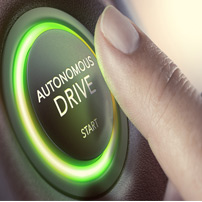Driverless Car Research
March 1, 2017 Given the latest technological advances in the auto industry, it is just a matter of time before driverless cars hit roads and highways across the country. The University of Maryland has been conducting driverless vehicle research and testing and has plans to expand this research into 2018. This will only be possible if the state gets approval to join a U.S. Department of Transportation program. According to Chuck Brown, Maryland Motor Vehicle Administration external affairs manager, the goal of the program is to invest more money in driverless technology, make safety improvements, and help get these vehicles on the roads more quickly.
Given the latest technological advances in the auto industry, it is just a matter of time before driverless cars hit roads and highways across the country. The University of Maryland has been conducting driverless vehicle research and testing and has plans to expand this research into 2018. This will only be possible if the state gets approval to join a U.S. Department of Transportation program. According to Chuck Brown, Maryland Motor Vehicle Administration external affairs manager, the goal of the program is to invest more money in driverless technology, make safety improvements, and help get these vehicles on the roads more quickly.
The proposal recommends a vehicle testing area that would include a section of the I-95 corridor from the Aberdeen Proving Ground in Harford County to the region that includes the University of Maryland. This particular area was chosen because it offers many private testing locations. This enables researchers to test the cars under a number of unique and relevant situations. For example, there are private racetracks that test many of the vehicle’s capabilities. In addition, they can test the self-driving car’s ability to move freight out of the Port of Baltimore, as well as shuttling passengers to and from BWI airport.
The Center for Advanced Transportation Technology Laboratory (CATT Lab) is just of one of the university’s facilities that could play a significant role in bringing driverless cars to fruition. In fact, it is one of the largest transportation research and development centers in the world, with more than 100 engineers, software developers and researchers. Currently, researchers in the lab are developing data feeds that give access to critical information including accident reports, weather, and traffic conditions in real time. Developers hope this data can help improve the vehicle’s technology and collect useful information about its performance.
Addressing Potential Safety Issues
As with any new technology, ironing out major safety issues is a priority for researchers and manufacturers. One issue that the CAT Lab is working on is the potential for hackers to break into the vehicle’s wireless communication system. The Lab is currently partnering with the Maryland Cyber Security Center and the National Transportation Center to make these vehicles more secure.
To address these and many other concerns, state officials want the public to know that safety is a top priority. Their Autonomous and Connected Vehicle Working Group is collaborating with the National Highway Traffic Safety Administration to develop guidelines for how law enforcement should respond when an autonomous vehicle is involved. Specific recommendations include making sure that all driverless vehicles are clearly marked so that, in the event of a car accident, law enforcement can signal the vehicle to stop and first responders can disable the vehicle.
Researchers and state officials continue to test these vehicles in an effort to develop autonomous vehicle technology that is safe above all. Motor vehicle accidents are one of the leading causes of deaths in the United States. As the technology and research continue and the safety features are perfected, autonomous vehicles have the potential to save lives.
Baltimore Car Accident Lawyers at LeViness, Tolzman & Hamilton Represent Car Accident Victims
If you have been injured in a car accident involving a self-driving car, our Baltimore car accident lawyers at LeViness, Tolzman & Hamilton are on your side and will provide the skilled legal representation you need to secure the financial compensation you deserve. To schedule a free consultation, call us today at 800-547-4LAW (4529) or contact us online.
Our offices are located in Baltimore, Columbia, Glen Burnie, and Towson, allowing us to represent personal injury victims in Maryland, including those in Anne Arundel County, Carroll County, Harford County, Howard County, Montgomery County, Maryland’s Western Counties, Southern Maryland, and the Eastern Shore, as well as the communities of Catonsville, Essex, Halethorpe, Middle River, Rosedale, Gwynn Oak, Brooklandville, Dundalk, Pikesville, Nottingham, Windsor Mill, Lutherville, Timonium, Sparrows Point, Ridgewood, and Elkridge.






